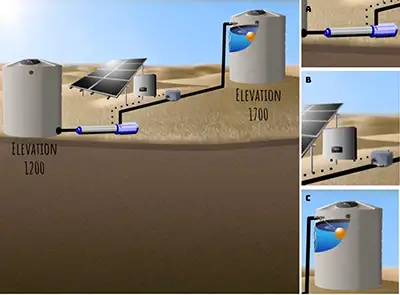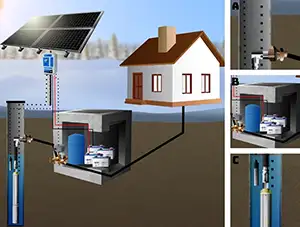Can I Run A Water Pump Straight From A Solar Panel?
Water pumps are one of the more energy intensive appliances on your energy bill, so it makes sense that folks often wonder if solar is a viable alternative. With energy bills continuing to inch higher year-over-year, more consumers are realizing that solar isn’t just applicable for whole home systems, but is often more efficient when paired with a DC appliance. With our DC Direct Solar Pumps, there’s no need for a big inverter to power the pump. In fact, we see that most water pumping applications are well suited for solar systems that are directly connected to solar panels. Let’s chat through a few examples of when a solar powered pump might be a better option compared to its AC counterpart:
Example 1: Josh’s utility company has hiked up rates for the third time in two years. With a growing family, he’s increasingly seeing monthly electrical bills over $200, and he knows the water pump is a significant percentage of that cost. He wants to go solar, but isn’t sure a solar pump is possible for his 100’ well going to a pressure tank. What can we suggest for him?
There’s a whole lot of different directions we can go here, but first off it IS certainly possible to replace Josh’s pump with a Direct Drive solar pump. Our RPS 800, for example, can handle 100’ of lift + 60 PSI of pressure going to his pressure tank, with an output of about 5.5 Gallons Per Minute (GPM). Let’s say theoretically Josh’s Static Water Level is at 60’, we place the pump at 80’, and his well production is 15 GPM (so there’s no fear of the pump outpacing the well production). With those additions to the calculation the pump would do more like 6.5 GPM.
If we look at this in terms of price savings, the RPS 800 is currently on sale for around $2,340. If you purchase the pump kit, plus a mounting kit for the solar panels, a solar-fitted pressure assembly and an AC autoswitcher for when there’s no sun, you’d be looking at a total of about $3,500. If we assume Josh’s water pump is half of his total monthly energy bill ($100), he’d make up the difference in three years, with another 10+ years of pumping lifespan as long as his well is fairly good quality. In this specific example, the switch to solar is a no-brainer. But what if we throw a wrench in the works?
Example 1b: Josh has our initial quote, but it’s not exactly what he was looking for. He was really hoping we could power his current 1HP 220V 10GPM pump with solar, because he’d prefer not to spend time or labor installing a new pump. Is just sending over some solar panels a possibility?
When we get customers like this who want to power an AC pump with solar, we always tell them it’s possible. However, AC pumps using solar are inherently less efficient than DC pumps using solar, so while it is not a big deal to add solar to this system, it would require more panels than an equivalent DC pump. We’d also need to confirm if the pump is 2-wire (2+G) or 3-wire (3+G). Most pumps will be 3-wire, in this case we’d send Josh over our PRO-Conversion Kit with 6x370W solar panels, a larger PRO Controller to handle the power transfer between the panels and your AC pump, and other accessories detailed in the link. If you combine that with mounting for the larger solar panels, you’re looking at a little over $4,000 with current discounts. So on the one hand Josh wouldn’t have to deal with pulling his pump or installing a new one, he would have to use a couple extra feet of his yard for the additional solar panels.
In these situations it’s completely up to the customer, but we do believe that solar pump installation is much simpler than you’d initially think. Our customers often end up just spending an afternoon on the install after flipping through our full-color manual and maybe texting a few questions to our support team. We find that the majority of property owners feel very comfortable after looking through our videos and manual, and where they don’t feel comfortable that’s where support is here to help!
Let’s look at one more modification to the above example so you can see how intricate our sizing process often ends up being!
Example 1c: After looking over his pump, Josh has realized it’s not actually a 3-wire, but a 2-wire system. He knows from previous conversations that a 2-wire pump is not compatible with our PRO Controller, but he’s set on using this pump and powering it with some solar panels. What can we do?
2-wire AC pumps are best run off of a strict 110V or 220V single phase electrical supply, which is not what our PRO Controllers output. The best option in that case is going to be our WaterSecure battery backup system, which has the added benefit of being paired with batteries for night-time pumping. While these backup modules can also connect to AC power, they are meant for off-grid use. For a 1HP pump we would recommend a 6 kW invertor, with optional numbers of solar panels and batteries depending on how much power Josh wants in the event of a power outage. WaterSecure backup systems can run any standard 110V or 220V electrical appliance, so while they are NOT designed for whole home backup we do have plenty of customers that use them to power appliances in the case of emergencies. Just ask our technicians for a handy 220V-110V splitter, on the house!
While this brief doesn’t cover all the ends and outs of solar pumping, you should be able to tell by now that it’s certainly a possibility, and often a good deal in the long-run. Of course, solar still has its shortcomings; panels need to have unobstructed access to sunlight, the pump needs an alternative power source if pumping at night (batteries, AC or generator), and if you’re living in a real rural place you need to make sure your panels and other equipment are safe and secure. But we think that the ‘negatives’ pale in comparison to the environmental benefits, cost-savings, and most importantly some energy independence from the craziness that is our power grid.
If you have more questions about our solar pumps, and which option is right for you, please call us at 888-637-4493, or email us at [email protected]. Our technicians don’t make commissions, which incentivizes them to get you the right product, not the most expensive one. We believe passionately in the ascendance of solar power, with the understanding that whole home solar just doesn’t make financial sense for some folks. As an alternative we hope you’ll consider our products, but until then have a great day!


